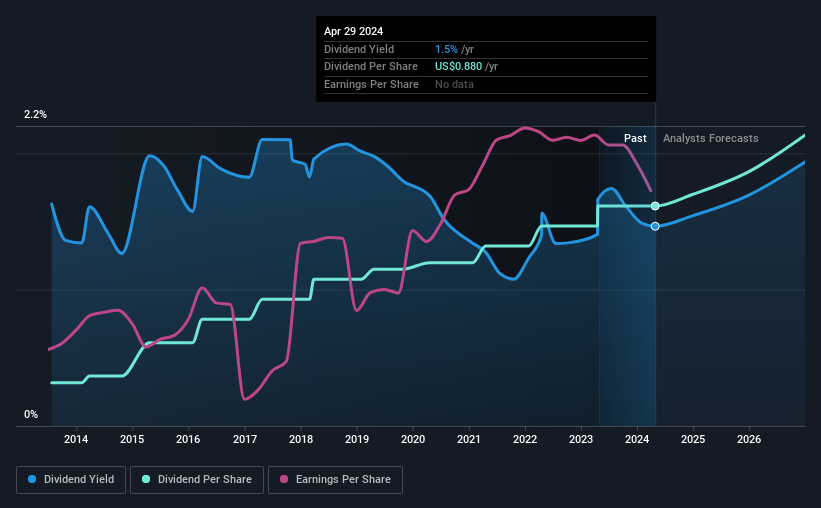Nasdaq (NASDAQ:NDAQ) Is Paying Out A Larger Dividend Than Last Year
Nasdaq, Inc.'s (NASDAQ:NDAQ) periodic dividend will be increasing on the 28th of June to $0.24, with investors receiving 9.1% more than last year's $0.22. Despite this raise, the dividend yield of 1.5% is only a modest boost to shareholder returns.
See our latest analysis for Nasdaq
Nasdaq's Dividend Is Well Covered By Earnings
Even a low dividend yield can be attractive if it is sustained for years on end. Based on the last payment, Nasdaq was quite comfortably earning enough to cover the dividend. This means that a large portion of its earnings are being retained to grow the business.
Looking forward, earnings per share is forecast to rise by 53.0% over the next year. If the dividend continues along recent trends, we estimate the payout ratio will be 39%, which is in the range that makes us comfortable with the sustainability of the dividend.
Nasdaq Has A Solid Track Record
The company has an extended history of paying stable dividends. Since 2014, the annual payment back then was $0.173, compared to the most recent full-year payment of $0.88. This works out to be a compound annual growth rate (CAGR) of approximately 18% a year over that time. Rapidly growing dividends for a long time is a very valuable feature for an income stock.
The Dividend Has Growth Potential
Investors who have held shares in the company for the past few years will be happy with the dividend income they have received. It's encouraging to see that Nasdaq has been growing its earnings per share at 9.9% a year over the past five years. The company is paying a reasonable amount of earnings to shareholders, and is growing earnings at a decent rate so we think it could be a decent dividend stock.
We should note that Nasdaq has issued stock equal to 18% of shares outstanding. Regularly doing this can be detrimental - it's hard to grow dividends per share when new shares are regularly being created.
We Really Like Nasdaq's Dividend
Overall, we think this could be an attractive income stock, and it is only getting better by paying a higher dividend this year. The company is easily earning enough to cover its dividend payments and it is great to see that these earnings are being translated into cash flow. Taking this all into consideration, this looks like it could be a good dividend opportunity.
Companies possessing a stable dividend policy will likely enjoy greater investor interest than those suffering from a more inconsistent approach. However, there are other things to consider for investors when analysing stock performance. To that end, Nasdaq has 2 warning signs (and 1 which makes us a bit uncomfortable) we think you should know about. Is Nasdaq not quite the opportunity you were looking for? Why not check out our selection of top dividend stocks.
Have feedback on this article? Concerned about the content? Get in touch with us directly. Alternatively, email editorial-team (at) simplywallst.com.
This article by Simply Wall St is general in nature. We provide commentary based on historical data and analyst forecasts only using an unbiased methodology and our articles are not intended to be financial advice. It does not constitute a recommendation to buy or sell any stock, and does not take account of your objectives, or your financial situation. We aim to bring you long-term focused analysis driven by fundamental data. Note that our analysis may not factor in the latest price-sensitive company announcements or qualitative material. Simply Wall St has no position in any stocks mentioned.

 Yahoo Finance
Yahoo Finance 
